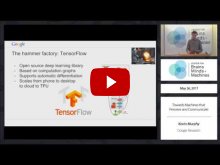 May 26, 2017 - 4:00 pm to 5:00 pm
May 26, 2017 - 4:00 pm to 5:00 pm Kevin Murphy (Google Research)
Host: Josh Tenenbaum
Abstract: In this talk, I summarize some recent work in my group related to visual scene understanding and "grounded" language understanding. In particular, I discuss the following topics:
- Our DeepLab system for semantic segmentation (PAMI'17, https://arxiv.org/abs/1606.00915).
- Our object detection system, that won first place in the COCO'16 competition (CVPR'17, https://arxiv.org/abs/1611.10012).
- Our instance segmentation system, that won second place in the COCO'16 competition (unpublished).
- Our person detection/ pose estimation system, that won second place in the COCO'16 competition (CVPR'17, https://arxiv.org/abs/1701.01779).
- Our work on visually grounded referring expressions (CVPR'16, https://arxiv.org/abs/1511.02283).
- Our work on discriminative image captioning (CVPR'17, https://arxiv.org/abs/1701.02870).
- Our work on optimizing semantic metrics for image captioning using RL (submitted to ICCV'17, https://arxiv.org/abs/1612.00370).
- Our work on generative models of visual imagination (submitted to NIPS'17).
I will explain how each of these pieces can be combined to develop systems that can better understand images and words.
Bio: Kevin Murphy is a research scientist at Google in Mountain View, California, where he works on AI, machine learning, computer vision, and natural language understanding. Before joining Google in 2011, he was an associate professor (with tenure) of computer science and statistics at the University of British Columbia in Vancouver, Canada. Before starting at UBC in 2004, he was a postdoc at MIT. Kevin got his BA from U. Cambridge, his MEng from U. Pennsylvania, and his PhD from UC Berkeley. He has published over 80 papers in refereed conferences and journals, as well as an 1100-page textbook called "Machine Learning: a Probabilistic Perspective" (MIT Press, 2012), which was awarded the 2013 DeGroot Prize for best book in the field of Statistical Science. Kevin is also the (co) Editor-in-Chief of JMLR (the Journal of Machine Learning Research).

